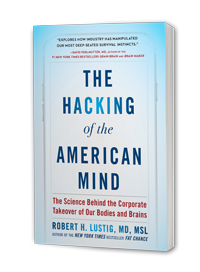Robert Lustig, M.D., M.S.L
The obesity epidemic began with government encouragement to eat a low fat high carbohydrate diet. Nobody knew about the ghrelin/leptin hunger switch in 1980. Insulin resistance was first identified in 1984, and some people still think it's unimportant.
There are about 600,000 packaged foods sold in the USA. Approximately 80% of those have added sweetness, sugar or sugar by another name. Manufacturers discovered that when they add sugar to almost any product the sales went up. Of course, everyone likes sweet things.
"The Hacking of the American Mind with Dr. Robert Lustig"
University of California Television (UCTV): Published on 6 Sep 2017
(33 minutes)
If the video won't play this link should work.
"Type 2 Diabetes Is "Processed Food Disease"
CrossFit®: Published on 22 Mar 2017
(31 minutes)
If the video won't play this link should work.
Recommended Books

“The Hacking of the American Mind: The Science Behind the Corporate Takeover of Our Bodies and Brains,” and what it means to be truly happy.

Fat Chance: Beating the Odds Against Sugar, Processed Food, Obesity, and Disease
"Ascribing personal responsibility to the obese individual is not a rational argument."
Robert Lustig
Dr. Lustig has fostered a global discussion of metabolic health and nutrition, exposing some of the leading myths that underlie the current pandemic of diet-related disease. He believes the food business, by pushing processed food loaded with sugar, has hacked our bodies and minds to pursue pleasure instead of happiness; fostering today’s epidemics of addiction and depression.
"Processed Food: An Experiment That Failed"
The Center for Hospitality and Culinary Arts at George Brown College: Published on 11 Sep 2017
(61 minutes)
If the video won't play this link should work.
The Resistance - Researchers, Practitioners, Educators, Advocates
Working together, we can solve this pandemic of diet-related disease. I am fortunate to be part of a movement that includes many amazing organizations, institutions, and talented individuals (researchers, practitioners, educators, advocates, journalists, policy makers, etc.). While we may represent a diversity of opinions and positions on metabolic health, nutrition, food, policy, etc., we are all moving the agenda forward in ways that are making a difference in the lives of millions.
"Politicians have to come in and reset the playing field. Alcohol, cigarettes, cocaine and sugar, are substances that are toxic, commonly used and with negative consequences for society," he says. "The businesses the produce and sell these products have a responsibility. They cannot be allowed to make money by making people sick."
Lustig argues that eating sugar creates a demand for more sugar. This is like an addiction, it's driven by physiology it's not about your willpower, or lack of it. He argues that the hormone related to stress, cortisol, is partly to blame. "When cortisol floods the bloodstream, it raises blood pressure; and increases the blood glucose level. Human research shows that cortisol specifically increases caloric intake of comfort foods." High cortisol levels during sleep, interfere with restfulness, and increase the hunger hormone ghrelin the next day.
"Sugar; The Newest and Bitterest Truth"
Berkeley-Haas: Published on 8 Mar 2016
(67 minutes)
If the video won't play this link should work.
The hunger hormone ghrelin, and the satiety hormone leptin operate like a switch turning the desire to eat on and off. But excess glucose in the blood stream is an emergency situation, which elevates insulin levels, because insulin's main purpose is to remove excess glucose form the blood. High insulin levels block the action of the ghrelin/leptin hunger switch.
Telling people to simply lose weight, "is physiologically impossible and it's clinically dangerous. It's a goal that's not achievable." He explains that, "Biochemistry drives behaviour." So the problem is embedded in our society, it's not one's personal fallibility that makes one sick and fat. That is now "normal" for our society, and as a society we have to do something about it. There isn't a fat person on earth that doesn't know that the problem is in the diet. The problem is also in our political system, because politicians don't want to fight with industry, they don't want to impose regulations on the food supply, and they don't want to restrict the growth of sales.
"The Case For and Against Food Addiction"
University of California Television (UCTV): Published on 6 Jan 2017
(23 minutes)
If the video won't play this link should work.
